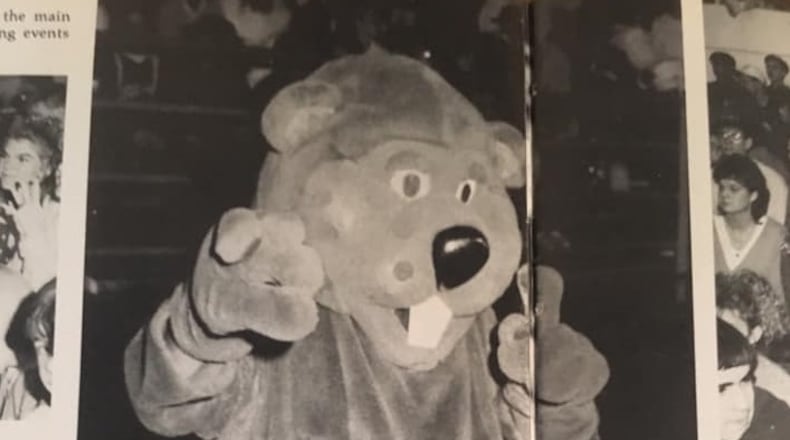A class of 1992 BHS grad, Nezhukumatathil is currently earning accolades from critics, as well as scoring considerable commercial success, for her new book “World of Wonders: In Praise of Fireflies, Whale Sharks, and Other Astonishments.” Previously, the book reached No. 5 on the New York Times Best Sellers list’s “Hardcover Nonfiction” category — just ahead of Michelle Obama’s “Becoming.” This week, in its fifth week on the list, it is No. 7.
The book was named Barnes & Noble’s 2020 Book of the Year, a New York Public Library Best Book of 2020, a Literary Hub “Most Anticipated Book of 2020″, and a Smithsonian Magazine “Top Ten Book About Travel of 2020″ — to name a few.
Nezhukumatathil’s life is all about keeping a sense of wonder about the unknown and maintaining a child-like love of curiosity and surprises. As Beavercreek’s high school mascot during her senior year, she surprised the entire community when the costume’s head was eventually removed in a “big reveal” of who had been serving as the team mascot.
Because her mother’s career kept the family on the move, Nezhukumatathil started at Beavercreek High School during junior year. She was a shy teenager struggling to fit in with the people “who knew each other since kindergarten,” she says.
Coming from a rural region in west New York where the Buffalo Bills dominated homeroom talk, Nezhukumatathil wrote in a 2018 article for ESPN that football was the one thing in Beavercreek she knew she loved.
“I was attracted to Beavercreek High’s football games: giddy for the grind and crunch of a play, for the smell of popcorn in waxy paper sacks and hot cocoa in white Styrofoam cups; how strangers in wooden bleachers, regardless of race and class, could become high-fiving friends in less than an hour,” Nezhukumatathil wrote.
To help feel at home in “this giant suburban school” and be a part of the school’s football sphere, Nezhukumatathil would volunteer to wear the Bucky the Beaver costume and eventually became one of the school’s first female mascots.
“I was on the tennis team and one of the assistant tennis coaches was like, ‘You know, I don’t know why we’ve only had guys during the mascot,’” Nezhukumatathil said.
As high school girls tried to find out who their classmate was — presumably a male classmate — behind the Bucky mask, Nezhukumatathil said she often received amorous greetings of “Hey Bucky!”
“But becoming Bucky Beaver brought me closer to the people who ultimately befriended me and made me more outgoing toward those who hadn’t,” Nezhukumatathil said. “Every Friday night, I slapped hands, hugged and danced with everyone and anyone in the stands. … I joined the student council and offered up opinions in meetings. Finally, I felt seen. I felt heard.”
Credit: CONTRIBUTED
Credit: CONTRIBUTED
Eventually, a mom of a cheerleader crafted Nezhukumatathil a bow to permanently wear atop Bucky’s head. Bucky’s identity, however, was still completely unknown to the school body.
A daughter of immigrant parents, Nezhukumatathil said having a daughter who performed at football games from inside a beaver costume was not something her parents were immediately fond of.
“You have to look at it from my parents’ (perspective),” Nezhukumatathil said. “They wanted me to be in pre-med. They’re like ‘We didn’t come to this country for you to be Mickey Mouse!’ They were so upset in the first place. But then when they came to our homecoming football game and they saw how much the crowd loved it and how much kids loved it … they finally acquiesced.”
Becoming Bucky may have foretold to her parents, and to Nezhukumatathil herself, that a future in medicine wasn’t the direction she was headed. The mascot’s strengths were in the humanities — in reading, writing and creative thinking.
“It sounds so ridiculous now, but in 1991, it was somewhat scandalous to have a girl as the football mascot,” Nezhukumatathil said. “You know, I use that nugget (of a story) very judiciously.”
About the Author



